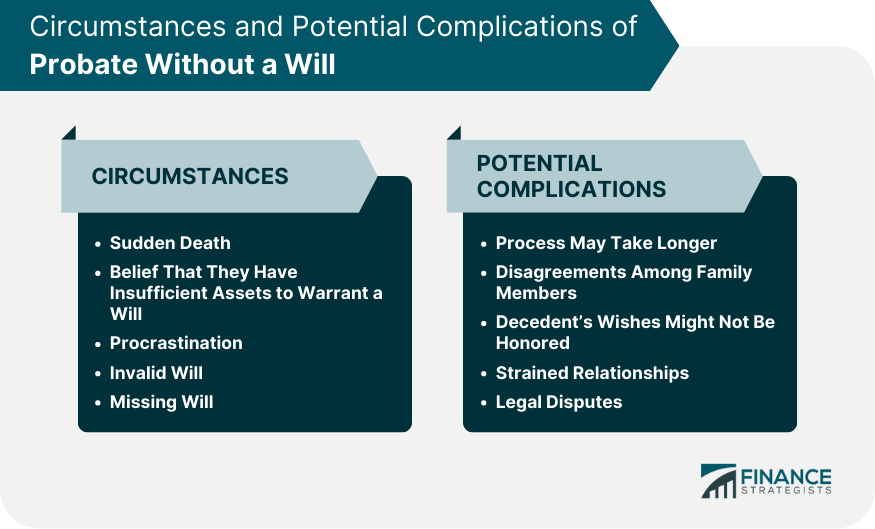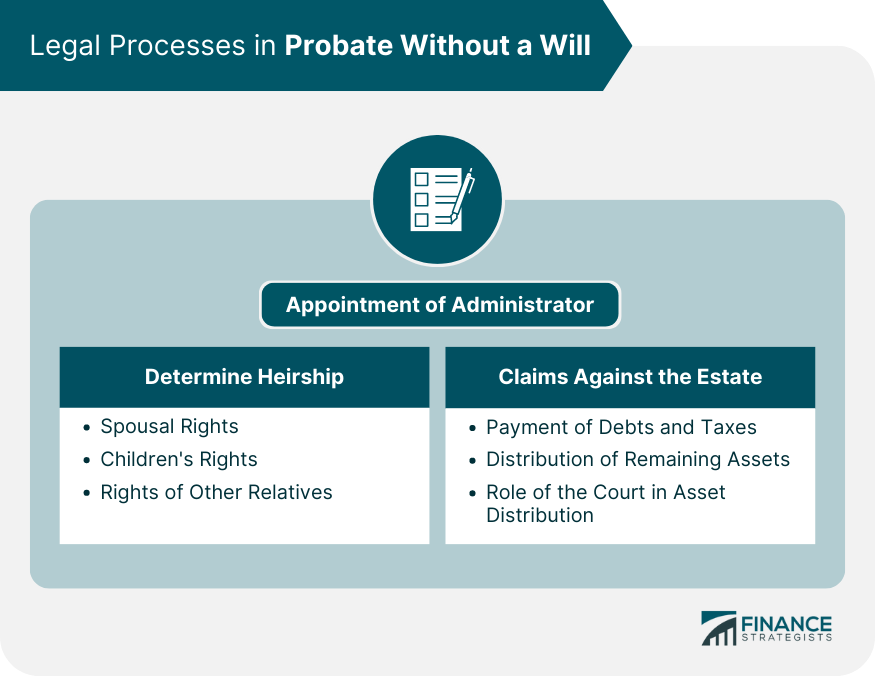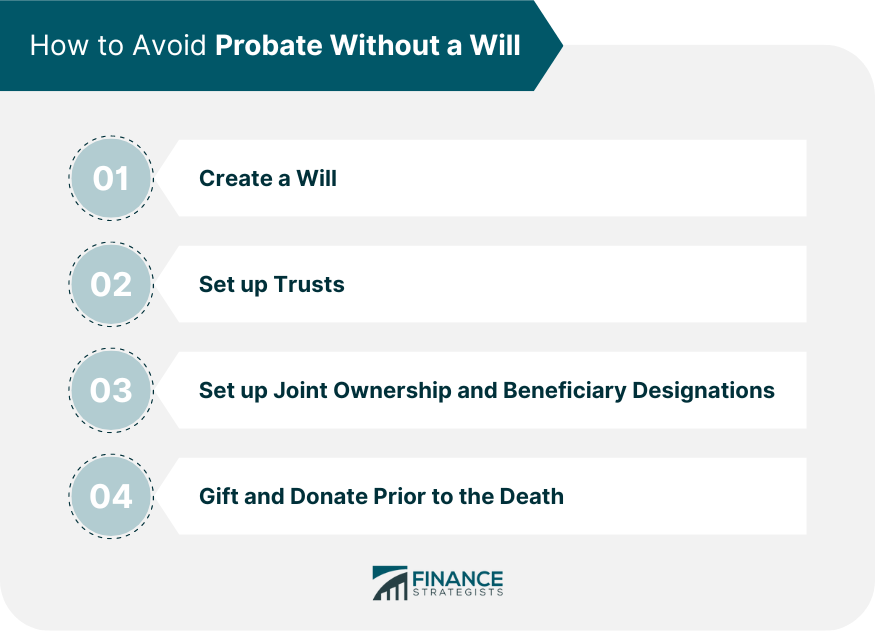Probate is a legal process where a will is "proved" in a court of law. This process validates the authenticity of the last will and testament of a deceased person, often referred to as the decedent. However, if a person dies without a will, the probate process involves determining how the deceased person's assets will be distributed under state law. When a person dies without a will, they are said to have died "intestate." In this case, state laws come into play to decide how their assets will be divided among surviving relatives. The process may become complicated, especially if the deceased person has a large estate or if the surviving relatives cannot reach an agreement on the distribution of the assets. Intestate succession laws vary by state, but they generally follow a similar hierarchy of heirs. Typically, the decedent's spouse and children are the first to inherit. If there are none, the state looks to other relatives like parents, siblings, and more distant relatives. There are several reasons why an individual might die without a will. These include sudden death, a belief that they have insufficient assets to warrant a will, or simply procrastination. It is also possible that the deceased had a will that is either invalid due to legal inconsistencies or cannot be located. The lack of a will can lead to multiple complications. The process may take longer as the court tries to verify the legitimate heirs and the rightful distribution of the assets. Disagreements among family members over the distribution can lead to strained relationships and even legal disputes. Moreover, the decedent's wishes for their estate might not be honored if they never formalized them in a will. In the absence of a will, the court will appoint an administrator, also known as the personal representative or executor. Usually, this will be a close relative of the deceased - typically the spouse or an adult child. If there is no suitable family member, the court may appoint a state official, a creditor, or a third-party administrator. The administrator's role is similar to an executor named in a will. They collect and manage the estate's assets, pay any debts or taxes, and distribute the remaining assets according to the state's intestacy laws. In the absence of a will, the laws of the state where the decedent lived at the time of death will govern the distribution of assets. These laws list the order of preference for heirs, which typically begins with the spouse and children, and then widens to other relatives if necessary. Under most state laws, a surviving spouse is usually entitled to a significant portion, if not all, of the deceased's estate. Children, including legally adopted ones, are often next in line to inherit if there is no surviving spouse, or they may share the estate with the surviving spouse. If the decedent had no surviving spouse or children, other relatives like parents, siblings, nieces, nephews, or cousins might inherit under the state's intestacy laws. The administrator must identify all creditors and notify them of the decedent's death. Creditors then have a set period to make claims against the estate for any debts the deceased owed them. Before distribution to the heirs, the administrator must use the estate's assets to pay off any outstanding debts and taxes. If the estate's value is insufficient, some assets may have to be sold to cover these costs. The administrator distributes the remaining assets according to the state's intestacy laws. This distribution is subject to court approval. The court plays a significant role in overseeing and approving the asset distribution process. The administrator must report to the court and provide an accounting of how the assets were managed and distributed. One of the major challenges that can occur in the process of probate without a will is establishing an heirship. Since there is no formal document outlining the deceased's wishes, determining the rightful heirs can become difficult. Establishing heirship can be particularly problematic when multiple marriages, stepchildren, or extramarital children are involved. Lack of a will often leads to disputes among surviving family members. These disagreements can stem from differing interpretations of the deceased's oral wishes, perceived fairness, or personal entitlements. These disputes can lead to protracted court battles and damaged relationships. In the event of disputes, parties involved may turn to legal mediation or resolution processes. These are mechanisms that aim to resolve disputes out of court, often with the help of a neutral third party, to expedite resolution and reduce costs. However, if these processes fail, the dispute may have to be resolved in court. Each state has its own laws governing intestate succession, meaning the process and rules can differ significantly from state to state. For instance, in some states, the surviving spouse inherits the entire estate, while in others, the estate might be split between the spouse and the decedent's parents or siblings. The probate process also varies by state. Some states have simplified procedures for smaller estates, while others require full court proceedings regardless of the estate's size. The complexity and length of the process can, therefore, vary depending on where the deceased lived at the time of death. The most effective way to avoid probate without a will is to create a will. Having a legally valid will can simplify the probate process by clearly designating beneficiaries, appointing an executor, and outlining how assets should be distributed. This can reduce the likelihood of disputes and ensure that the deceased's wishes are fulfilled. Trusts, specifically revocable living trusts, play a crucial role in avoiding probate. Assets placed in such a trust are immediately accessible to the named beneficiaries upon the trust creator's death, bypassing probate entirely. The trust also allows for greater privacy, as unlike probate, it is not a public process. Assets held in joint ownership with rights of survivorship pass directly to the surviving owner without going through probate. Similarly, assets with designated beneficiaries, such as life insurance policies or retirement accounts, are transferred directly to the beneficiaries, avoiding the probate process. Another way to avoid probate is to gift assets or make donations prior to death. This reduces the size of the estate that would need to go through probate. However, it's important to note that there may be tax implications, so professional advice should be sought before making substantial gifts. Navigating the probate process without a will can be a complicated task. From the appointment of an administrator to the identification and payment of debts and taxes, multiple steps are involved. The process becomes even more intricate when it comes to determining heirship and distributing assets, especially when state laws differ, and family disputes arise. However, this underscores the importance of careful estate planning. A well-structured estate plan, including a will, reduces potential disputes among heirs, ensures the decedent's wishes are honored, and simplifies the probate process. The discomfort around discussing mortality often delays or discourages the process of drafting a will. However, it is vital to rise above these reservations for the sake of one's heirs. By taking control of what happens to your assets after your death, you prevent the state from making these decisions for you.Overview of Probate
Understanding Probate With No Will
Defining Intestate Succession
Circumstances Leading to Probate Without a Will
Potential Complications in Probate Without a Will

Legal Processes in Probate Without a Will
Appointment of Administrator
Who Can Be an Administrator
Duties and Responsibilities of an Administrator
Determining Heirship
Law's Default Succession Rules
Spousal Rights
Children’s Rights
Rights of Other Relatives
Claims Against the Estate
Identification and Notification of Creditors
Payment of Debts and Taxes
Distribution of Remaining Assets
Following Intestate Succession Laws
Role of the Court in Asset Distribution

Possible Disputes and Resolutions
Challenges in Establishing Heirship
Disputes Among Family Members
Legal Mediation and Resolution Processes
Impact of Probate Laws by State
Differences in Intestate Succession Laws
Comparison of Probate Processes in Different States
How to Avoid Probate Without a Will
Create a Will
Set up Trusts
Set up Joint Ownership and Beneficiary Designations
Gift and Donate Prior to the Death

Bottom Line
Probate With No Will FAQs
In probate without a will, the court appoints an administrator to distribute the deceased person's assets according to state intestacy laws, pay any debts, and settle any tax liabilities.
Without a will, the state's intestacy laws dictate who inherits the estate. Typically, the spouse and children are the primary inheritors, but it can extend to other relatives if there are no immediate family members.
The duration of probate without a will varies depending on the complexity of the estate, the efficiency of the appointed administrator, and the laws of the state. It can take anywhere from a few months to several years.
Yes, strategies such as creating a living trust, designating beneficiaries on accounts, joint ownership, and gifting before death can help avoid probate.
Complications can arise from disputes among family members, difficulties in identifying legitimate heirs, challenges in determining the distribution of assets, and delays due to court processes.
True Tamplin is a published author, public speaker, CEO of UpDigital, and founder of Finance Strategists.
True is a Certified Educator in Personal Finance (CEPF®), author of The Handy Financial Ratios Guide, a member of the Society for Advancing Business Editing and Writing, contributes to his financial education site, Finance Strategists, and has spoken to various financial communities such as the CFA Institute, as well as university students like his Alma mater, Biola University, where he received a bachelor of science in business and data analytics.
To learn more about True, visit his personal website or view his author profiles on Amazon, Nasdaq and Forbes.















